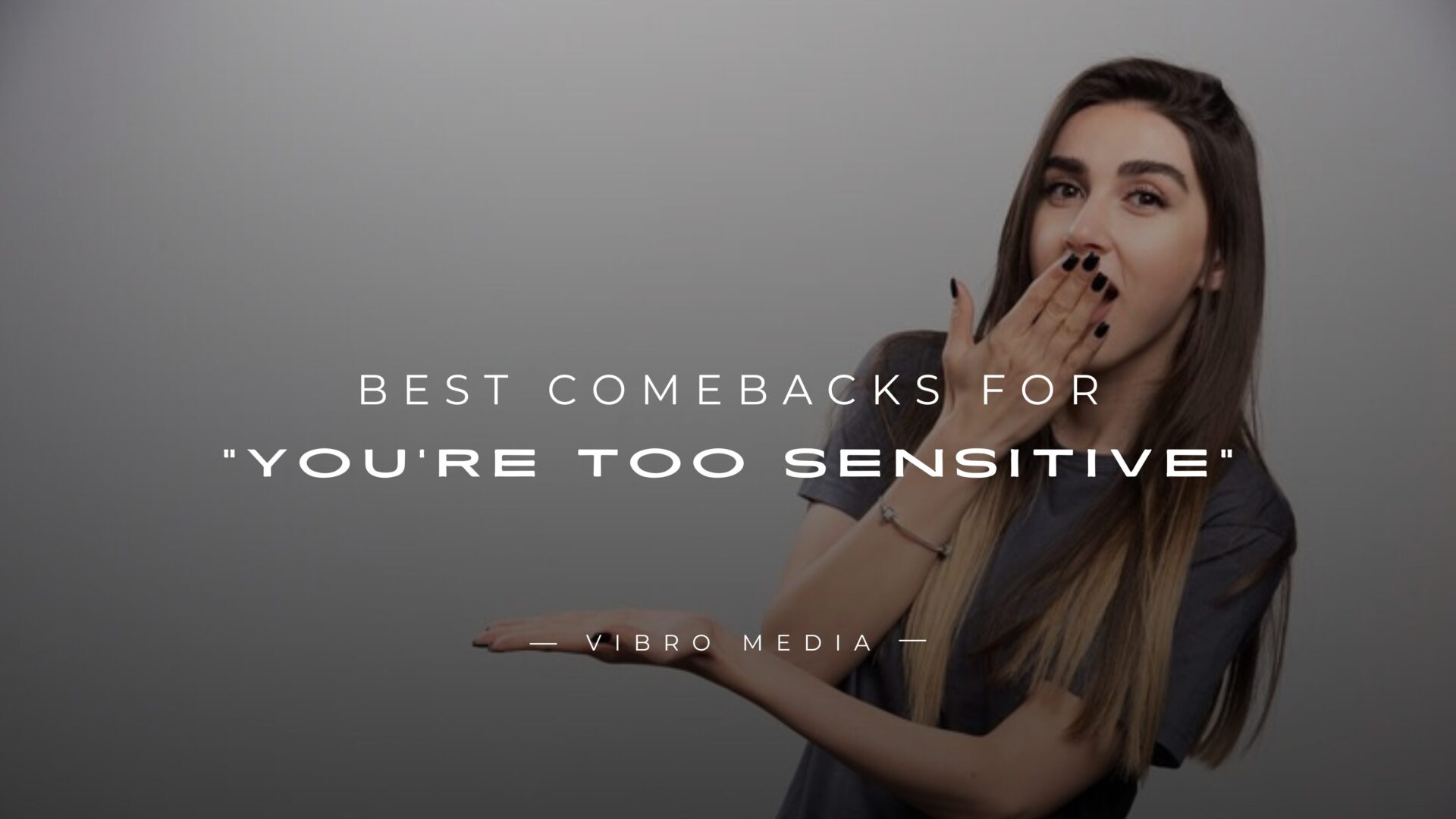Being told, “You’re too sensitive,” can feel like a punch in the gut, can’t it? Whether it’s a friend, family member, or co-worker throwing that comment your way, it stings. But why does it hurt so much? More importantly, how should you respond without feeling diminished or invalidated?
In this article, we’ll dive deep into the dynamics of this phrase, why it’s often used, and how you can handle it in a way that preserves your dignity and emotional well-being. By the end, you’ll feel better equipped to respond and empowered to embrace your sensitivity as a strength, not a flaw.

200+ Comebacks for “You’re Too Sensitive”
Assertive Responses
- I’m not too sensitive; I just know how to express myself.
- I’m entitled to feel the way I do, and that’s not a weakness.
- Just because I show emotion doesn’t mean I’m too sensitive.
- Sensitivity is a sign of strength, not a flaw.
- I’m not overly sensitive; I’m just honest about my feelings.
- If you can’t handle my emotions, that’s your problem, not mine.
- I’ll be sensitive if that’s what it takes to make you understand me.
- I’m not going to apologize for being in touch with my emotions.
- It’s not that I’m sensitive; I just don’t tolerate disrespect.
- My feelings are valid, and I’m not afraid to express them.
Humorous or Sarcastic Responses
- Oh, I’m too sensitive? Next, you’ll tell me I’m too awesome.
- Maybe I’m just allergic to nonsense.
- I’m sensitive because I’m a rare and delicate flower.
- If being sensitive is wrong, I don’t want to be correct.
- I’m just a walking, talking, emotional sponge—what’s the problem?
- I guess I’m the emotional equivalent of a Netflix drama.
- I could be less sensitive, but then I’d be like you.
- Maybe I’m just in touch with my inner diva.
- Sensitive? No, I’m just emotionally advanced.
- I’m so sensitive I could cry at the sight of a kitten.
Deflecting Responses
- I’m not the problem here; it’s how you act.
- I’m only sensitive because you’ve crossed a line.
- Maybe I’m sensitive because I care about what happens.
- Could you be just not used to people being honest about their feelings?
- Perhaps you’re not sensitive enough to notice when you’ve hurt someone.
- I’m reacting this way because I’ve been pushed too far.
- If I seem sensitive, it’s probably because I’m reacting to your insensitivity.
- You’d be sensitive, too, if you dealt with what I’ve been through.
- I’m not being sensitive; I’m just responding to your behavior.
- It’s not about being sensitive; it’s about being treated with respect.
Empathetic Responses
- I understand you don’t see it that way, but this is how I feel.
- I’m sorry if my feelings seem too much for you, but this is my reality.
- I know you might not understand, but I can’t help how I feel.
- I get that you don’t see it that way, but that doesn’t make my feelings any less accurate.
- It’s not about being overly sensitive, it’s about how I’m processing things.
- I’m just expressing how I feel, and I hope you can appreciate that.
- I understand where you’re coming from, but I need you to know where I’m coming from.
- I can see why you might not understand, but I’m just trying to be honest.
- It’s okay to have different perspectives, but my feelings matter.
- I’m just being honest about my emotions, and I hope you can empathize.
Philosophical Responses
- Isn’t it better to feel deeply than to go through life indifferent?
- Being sensitive is part of being human; we should embrace it.
- If I’m too sensitive, maybe I’m more aware of the world around me.
- Sensitivity allows me to connect with others on a deeper level.
- What’s wrong with being in tune with one’s emotions? It’s part of our humanity.
- Being sensitive means I’m paying attention to things others might ignore.
- Maybe I’m not sensitive enough, and that’s the real problem.
- Feeling deeply is a gift, not something to be ashamed of.
- The world could use more sensitivity and less apathy.
- It’s not about being sensitive; it’s about being wise and aware.
Direct or Blunt Responses
- If youYou should stop being inconsidon’tifon’t want me to be sensitive are; you not too sensitive; I’m just not willing to put up with disrespect.
- Maybe I’m not too sensitive, but you’re too rude.
- I’m just expressing my feelings. Is that a problem for you?
- If there is a better match.
- If that’s how you ffeelas posse to, I’ll get my point across.
- Your lack of empathy is the real issue here, not my sensitivity.
- I will keep being true to myself, regardless of how you feel.
- If being sensitive means standing up for myself, I’m sensitive.
- If you find me too sensitive, that’s your problem, not mine.
Intellectual Responses
- Sensitivity is often linked to emotional intelligence, which is a strength.
- Studies show that emotional awareness can lead to better decision-making and relationships.
- Sensitivity is a form of intelligence—I’m not s.
- Being sensitive helps me navigate complex emotional landscapes, something I value.
- Psychologically, sensitivity is a sign of deeper awareness, not weakness.
- Sensitivity is a sign of being fully engaged with the world around you.
- In philosophical terms, sensitivity allows us to experience the world more profoundly.
- Emotionally intelligent people tend to be more sensitive to the needs of others.
- It’s been scientifically proven that being emotionally open leads to better mental health.
- Perhaps it’s not sensitivity but emotional depth that you’re misunderstanding.
Supportive or Validation-Based Responses
- Your feelings and mine are valid—let’s try to understand each other.
- Everyone has their own way of processing emotions, and this is mine.
- It’s okay to feel things deeply; it just means you care.
- I understand why you might not get it, but I must feel heard.
- Being sensitive isn’t bad; it means I’m emotionally aware.
- It’s okay to be sensitive; we’re all entitled to our emotions.
- I hear you, but my feelings are just as valid as yours.
- You don’t have to agree with me, but my sensitivity is part of who I am.
- Being sensitive helps me relate to others and connect on a deeper level.
- It might seem excessive, but this is how I handle things emotionally.
Logical or Practical Responses
- I’d probably miss essential details or hurt feelings if I weren’t sensitive if I weren’t sensitive.
- Being sensitive helps me avoid conflicts and better understand others.
- If everyone were less sensitive, we’d all just walk over each other.
- Sensitivity is a practical tool—it keeps me aware of people’s needs.
- I need to be sensitive to ensure I don’t unintentionally hurt anyone.
- I’m sensitive because I value relationships and don’t want to damage them.
- Being aware of my emotions helps me make more thoughtful decisions.
- It’s better to be sensitive than indifferent, leading to more positive outcomes.
- You might think it’s excessive, but being sensitive is how I protect myself.
- Sensitivity is a survival skill, not a flaw. It helps me navigate complex situations.
Reassuring Responses
- I’m okay. I just feel things deeply, and that’s fine.
- You don’t have to worry about me. I’m just expressing how I feel.
- It’s just who I am and it doesn’t mean I’m fragile.
- I promise I’m not falling apart—I’m just being honest about my feelings.
- I understand if it seems a lot, but I’m just being true to myself.
- You’re not doing anything wrong; I’m just expressing my emotions.
- My sensitivity doesn’t mean I’m weak; it means I care.
- It’s okay for me to feel what I feel. I’m just letting you know.
- You don’t need to fix me; I’m just fine as I am.
- I’m not upset, just emotional, and that’s perfectly normal.
Self-Reflective Responses
- Maybe I am a little sensitive, but I think it’s part of who I am.
- I might be too sensitive, but I’m learning to manage it better.
- Sometimes, I wonder if I’m too sensitive, but I think it’s how I process things.
- I tend to feel things deeply, but that makes me more empathetic.
- I know I can’t be sensitive, but I’m working on balancing it.
- I try to be less sensitive, but I’ve struggled with it for a while.
- Maybe I take things to heart too quickly, but that’s how I experience the world.
- I know I can be sensitive, but it’s something I’ve learned to embrace about myself.
- Sometimes, I get caught up in my emotions, but I’m learning to step back.
- I acknowledge that I’m sensitive and working on finding a healthy balance.
Confidence-Based Responses
- If being sensitive is part of who I am, I’m proud of it.
- I’m confident in my sensitivity; it makes me empathetic and honest.
- My sensitivity is part of my strength, and I wouldn’t change it.
- I’m not afraid to feel deeply, which makes me a better person.
- I’m confident in expressing my feelings, even if it makes others uncomfortable.
- Sensitivity isn’t something I’m ashamed of; it’s a sign of my emotional intelligence.
- I’d rather be sensitive and honest than hide my feelings.
- I’m comfortable with my emotions and not afraid to show them.
- Being sensitive is part of my authenticity, and I stand by it.
- I’m proud of my sensitivity—a vital part of what makes me me.
Contradictory Responses
- You say I’m too sensitive, but I think it’s how I process things.
- If I were less sensitive, maybe I wouldn’t care as much about your opinion.
- I’m only sensitive because I care—maybe you should try it sometime.
- I’m sensitive, but maybe you’re not sensitive enough to understand that.
- I’m sensitive, but that’s what keeps me from being emotionally numb like others.
- I wouldn’t notice the things that hurt others if I were less sensitive if I were less sensitive.
- I’m sensitive, but that doesn’t mean I’m weak—quite the opposite.
- You call me sensitive, but maybe you’re too desensitized to see how things affect me.
- I’m sensitive, but it’s better than being indifferent or cold.
- If I’m too sensitive, maybe you’re just not paying enough attention to how your words affect people.
Philosophical Reframing
- Sensitivity is the only way to experience the richness of life indeed. indeeIndeedndeedivity is a gift, not a flaw, that allows me to connect with others.
- It..s not about being sensitive; it’s about having the courage to feel deeply.
- I see sensitivity as a strength—it means I’m open to the world in a way others aren’t.
- Sensitivity makes life meaningful; it allows us to care about what happens.
- The world may be better off if more people were as sensitive as I am.
- It’s not about being overly sensitive but valuing emotions as part of our human experience.
- What if my sensitivity makes me truly alive and present in the moment?
- The more sensitive we are, the more connected we become to each other’s experiences.
- Sensitivity is the emotional intelligence we need to navigate an indifferent world.
Empowerment-Based Responses
- Being sensitive means I’m in touch with my emotions, and that’s something to be proud of.
- I’d rather be sensitive and accurate than numb and detached.
- My sensitivity empowers me to connect with others on a deeper level.
- I’m proud of my sensitivity; it’s a powerful tool for understanding myself and others.
- Sensitivity doesn’t make me weak; it makes me stronger in knowing what I need.
- Being sensitive means I care deeply—nothing more empowering than that.
- I embrace my sensitivity; it’s one of my greatest strengths.
- My emotions are my power; I won’t let anyone diminish that.
- Sensitivity isn’t a weakness; it’s a way of standing in my truth.
- I don’t need to be less sensitive, I need to be more empowered in who I am.
Perspective-Challenging Responses
- You may be too focused on the surface and not seeing the more profound impact.
- Perhaps you’re missing the reason behind my sensitivity—it’s not just about me.
- Have you considered that your words affected me more than you intended?
- Maybe you’re not seeing the whole picture, so you think I’m too sensitive.
- If you were more aware of my feelings, maybe you wouldn’t think I’m too sensitive.
- It’s not about being too sensitive; it’s about seeing things from a different perspective.
- You might think I’m sensitive, but you must be more empathetic.
- I’m not being too sensitive—I’m simply responding to your lack of awareness.
- Maybe the problem isn’t my sensitivity but your inability to understand my feelings.
- What if my sensitivity is me being more aware of my emotions and yours?
Metaphoric Responses
- I’m not too sensitive—I’m like a mirror, reflecting what I see.
- I’m a sponge; I absorb emotions, and sometimes they’re just too much.
- I’m not too sensitive; I’m like a flower blooming with my emotions.
- Sensitivity is my superpower—it helps me read the emotional landscape of the world.
- I’m like a violin string—tuned to pick up the slightest feeling of vibration.
- Think of me as a lighthouse—my sensitivity helps guide others through emotional storms.
- I’m a candle; I shine bright and feel deeply, even if I burn a little.
- I’m like a wind chime; my emotions move with the slightest breeze.
- I’m a river; my sensitivity flows deeply and carries everything in its current.
- I’m a tree; my roots are susceptible to the world, but that’s how I grow.
Educational or Informative Responses
- Did you know that sensitivity is linked to higher emotional intelligence?
- Being sensitive is a sign of empathy and emotional awareness—essential for meaningful connections.
- Studies show that sensitive people tend to have better social and emotional skills.
- Sensitivity is a natural human trait that helps us adapt to our environments.
- Psychologists believe that sensitivity is an indicator of emotional depth and intelligence.
- Sensitivity is a psychological trait that allows people to be more attuned to the emotions of others.
- Being sensitive isn’t a flaw—it’s part of the range of human emotional experiences.
- Many studies show how emotional awareness helps people thrive in relationships and work.
- Sensitivity isn’t just about feeling more—it’s about processing the world more deeply.
- Did you know sensitive people often excel in creative and emotional intelligence?
Passive-Aggressive Responses
- Oh, I’m sorry I have feelings—how inconvenient for you.
- Maybe I’ll just start pretending I don’t care, like everyone else.
- I’ll try to be less sensitive next time after completely shutting off my emotions.
- I’ll try to be less of a human and more like a robot so I don’t hurt your feelings.
- I’ll just bottle everything up so I don’t annoy you with my emotions.
- Next time, I’ll hide my sensitivity under a mask of indifference.
- Thanks for the advice; I’ll work on becoming more numb to the world.
- I’ll be sure to turn off my empathy so I don’t come off as ‘too sensitive.’
- I’ll ignore my feelings completely; that should make everything easier, right?
- I’ll stop being so sensitive if you stop being inconsiderate.
Inspirational Responses
- My sensitivity is my gift; it helps me see the world with more compassion.
- Being sensitive helps me be there for others—it’s a strength, not a weakness.
- I wear my sensitivity like armor; it protects me from the world’s coldness.
- Sensitivity allows me to live fully and deeply—how I experience everything.
- I’m proud of my sensitivity. It lets me be authentic in every moment.
- The world needs more sensitivity—the key to empathy and connection.
- Being sensitive means I care enough to feel deeply; I wouldn’t change that for the world.
- I embrace my sensitivity because it allows me to bring light into the lives of others.
- True strength lies in feeling deeply and expressing those emotions honestly.
- I believe sensitivity is the root of emotional growth—without it, we wouldn’t evolve.
Understanding the Impact of Being Called “Too Sensitive”
The words “You’re too sensitive” can hit hard, even if the person saying them doesn’t mean to be hurtful. When someone labels your emotional reactions as “too much,” it often feels like they’re saying your feelings are invalid or that you’re wrong for feeling the way you do. That can mess with your self-esteem and make you second-guess your emotions.
Let’s face it: we live in a world where emotions are sometimes brushed aside or seen as a weakness. So, when someone calls you “too sensitive,” it can feel like they’re confirming that idea.
Why People Say “You’re Too Sensitive”
There are a few common reasons why someone might throw this phrase at you. Understanding its motivations can help you see it more clearly and react constructively.
- Projection of Their Issues
Sometimes, when people aren’t comfortable with their emotions, they project that discomfort onto others. By calling you “too sensitive,” they might reflect their inability to deal with emotional complexity.
- Lack of Emotional Awareness
Not everyone is good at handling emotions. If someone lacks emotional intelligence or awareness, they might label you as sensitive simply because they don’t understand the depth of what you’re feeling.
- Invalidation of Your Feelings
Saying “You’re too sensitive” can sometimes be a way to shut down a conversation or avoid dealing with the real issue. It’s a quick way to dismiss your feelings without addressing them.
Common Reactions to “You’re Too Sensitive”
When you hear this phrase, your immediate reaction might be to get defensive, shut down, or start overthinking your emotions. Sound familiar?
- Becoming Defensive
It’s easy to feel like you have to justify your feelings. You might start explaining yourself or trying to prove your emotions are valid. But in doing so, you might only escalate the situation.
- Shutting Down Emotionally
Conversely, some people shut down completely, bottling up their emotions to avoid conflict. The problem with this approach is that it often leads to pent-up frustration and resentment over time.
- Overthinking Your Reactions
Hearing “You’re too sensitive” might make you spiral into self-doubt. You start overanalyzing every feeling, questioning whether you’re overreacting, and eventually suppressing your emotions.
Why It’s Okay to Be Sensitive
Here’s the thing: being sensitive isn’t a bad thing. Sensitivity can be a superpower regarding empathy, emotional intelligence, and forming deep connections with others.
- Sensitivity is a Strength, Not a Weakness
Sensitivity allows you to tune into your emotions and the emotions of others. This ability can make you more compassionate and understanding—often undervalued qualities.
- Embracing Empathy and Emotional Awareness
When you embrace your sensitivity, you’re also embracing your empathy. Feeling deeply can help you create meaningful relationships and be a better listener.
How to Respond to “You’re Too Sensitive”
So, how do you respond when someone drops the “You’re too sensitive” bomb on you? Here’s a step-by-step approach to help you maintain your composure and answer confidently.
- Take a Moment Before Reacting
First things first—pause. Take a deep breath and resist the urge to react immediately. This helps you avoid saying something at the moment that you might regret later.
- Acknowledge and Validate Your Feelings
It’s important to remind yourself that your feelings are valid, no matter what someone else says. Tell yourself, “It’s okay to feel this way.” This simple affirmation can go a long way in regaining your emotional balance.
- Set Boundaries with the Other Person
If someone repeatedly dismisses your emotions, it might be time to set a boundary. Let them know that their comment isn’t helpful and that you’d appreciate it if they didn’t diminish your feelings in the future.
- Redirect the Conversation
Sometimes, the best way to defuse the situation is to redirect the conversation. Instead of getting stuck on “You’re too sensitive,” steer the conversation back to the issue. This can help shift the focus back to the real problem rather than your emotional response.
Responding with Confidence
Once you’ve taken a moment to process, it’s time to respond with confidence. Here’s how to do that without losing your cool.
- Use “I” Statements
Instead of saying, “You’re being rude,” try something like, “I feel hurt when my emotions are dismissed.” This puts the focus on your feelings rather than blaming the other person.
- Stay Calm and Assertive
It’s crucial to stay calm and not let your emotions take over. Speak clearly and assertively, ensuring your message is heard without escalating into an argument.
- Avoid Getting Pulled into an Argument
Some people might try to argue with you or continue dismissing your feelings. Don’t take the bait. Stick to your boundaries and avoid getting drawn into a back-and-forth that won’t lead anywhere productive.
Examples of Responses You Can Use
Here are a few examples of what you might say when someone says, “You’re too sensitive.”
- Calm and Direct Responses
“I understand you see it that way, but I’m allowed to feel how I feel.”
“I don’t think sensitivity is a bad thing—it helps me understand others better.”
- Thoughtful and Reflective Responses
“I’m sorry if my reaction surprised you, but this is important to me, and I’d appreciate it if you listened to why.”
“Maybe I am more sensitive than others, but that doesn’t mean my feelings are invalid.”
- Setting the Record Straight
“My sensitivity isn’t the issue here. Let’s talk about what’s bothering us.”
Long-Term Strategies for Dealing with Sensitivity Criticism
If you often hear people telling you you’re too sensitive, here are some long-term strategies to help you cope.
- Building Emotional Resilience
Emotional resilience doesn’t mean you stop feeling deeply—it just means you can better manage those emotions. Practice mindfulness, deep breathing, or journaling to help healthily process your feelings.
- Practicing Self-Compassion
Remember, it’s okay to feel hurt or overwhelmed. Be kind to yourself when those emotions come up. Instead of judging yourself for being sensitive, practice self-compassion and remind yourself that everyone experiences emotions differently.
- Surrounding Yourself with Supportive People
Make sure to keep people around who appreciate and respect your sensitivity. A support system can significantly affect how you feel about yourself and your emotions.
How to Turn Sensitivity into a Superpower
Your sensitivity is one of your greatest assets in relationships and at work.
- Using Sensitivity in Relationships
Being sensitive allows you to connect on a deeper level with others. You’re more likely to pick up on subtle emotions, making you a great partner, friend, or listener.
- Leveraging Emotional Intelligence at Work
Emotional intelligence can help you navigate complex social situations, manage teams more effectively, and handle stress better at work. Your sensitivity can be your key to success in leadership and teamwork.
- Practicing Mindfulness to Manage Overwhelm
If your sensitivity ever feels overwhelming, practicing mindfulness can help ground you. By staying present and aware of your emotions, you can prevent yourself from being swept away by them.
Breaking Free from the Negative Connotation of “Sensitive”
It’s time to reject the idea that being sensitive is a flaw. Sensitivity is emotional strength, and it’s something to be proud of.
- Reframing Sensitivity as Emotional Strength
When someone calls you sensitive, see it as a compliment. It means you’re in tune with your emotions and those around you.
- Rejecting the Stigma
There’s no need to conform to the idea that emotions are weak. Stand firm in your emotional awareness and let others see that your sensitivity is a source of power, not shame.
When to Walk Away from a Conversation
Sometimes, the best response is no response. If the person continues to invalidate your feelings, it might be best to walk away.
- Recognizing Toxic Communication Patterns
If someone consistently tells you you’re too sensitive, they may use it to manipulate or control the conversation. Recognize when this happens and protect yourself from toxic dynamics.
- Protecting Your Emotional Energy
Your emotional energy is precious. Don’t waste it on people unwilling to respect your feelings. Walk away from conversations that leave you feeling drained or unheard.
What If You Are Being Overly Sensitive?
Let’s face it, sometimes we can be overly sensitive. That’s okay, too—what’s important is how we handle it.
- How to Self-Reflect Without Self-Judgment
If you’re worried that you might be overreacting, take time to self-reflect. Ask yourself if your response matches the situation, but do so without harshly judging yourself.
- When Sensitivity Might Need to Be Managed
If your sensitivity is causing you distress or affecting your relationships, it might be worth exploring ways to manage it. Therapy or self-help practices can help you find a balance that works for you.
Conclusion
In conclusion, being labeled “You’re too sensitive” can be frustrating, but with the right comebacks, you can confidently stand up for yourself without compromising your values. Whether you choose a witty response or a more thoughtful approach, the key is to assert your boundaries while staying true to who you are. If you’re looking for even more ways to handle criticism, check out our guide on the 200+ Best Comebacks for Dealing with Unfair Judgments Here to help you navigate those tricky situations gracefully and confidently.
FAQs
Q. Why do people often say, “You’re too sensitive”?
People may say this to dismiss your emotions or because they’re uncomfortable dealing with emotional complexity.
Q. How can I stop taking things too personally?
Mindfulness and building emotional resilience can help you manage your sensitivity without internalizing every comment.
Q. How do I know if I’m overly sensitive or just aware?
Self-reflection is critical—if your reactions seem disproportionate to the situation, it might be worth exploring if you’re overly sensitive.
Q. Can sensitivity be a strength in relationships?
Absolutely! Sensitivity makes you empathetic and emotionally attuned to others, making you a more caring partner.
Q. What should I do if I feel hurt by someone’s comment?
Take a moment to process, then respond calmly and assertively. Let the person know how their comment made you think without escalating into an argument.











“Standing ovation! 🌠 This post perfectly balances depth with accessibility. Your thorough research and expert explanations make this an invaluable resource. Keep up the amazing work!”